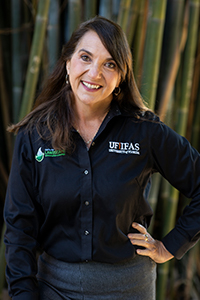Wendy's Wanderings
May 9, 2023
Summer Gardening Challenges
"Plant a vegetable garden," they said. "It will be fun," they said.
It is fun to grow your own vegetables when everything goes right, but we are getting to the point in the growing season when challenges arise. Even if you planned perfectly with the UF/IFAS vegetable gardening guide in hand and have a bright green thumb you may be experiencing a few problems in the garden. Most of them can be overcome with gardening know-how and a little experience under the belt.
I have fielded a few questions about tomato problems this month already. Tomato leafminers have been out in full force. These small flies lay eggs underneath the top layer of the leaf and the hatched larva form a thin serpentine pattern of white trails over the leaf surface. We usually see this problem from March until June, but the insect is present year-round. In fact, it over-summers in weeds around the garden, especially on Spanish needles (Bidens alba). This is a good reason to keep the garden area free of weeds in the off season. Leafminers usually don't cause that much damage, and they are often controlled by natural predators. They have a wide range of host plants including bean, celery, eggplant, pepper, and squash but tomato is usually the crop that is most impacted. Learn more about leafminers in this UF/IFAS IPM publication (pdf).
Another challenge I have helped gardeners with this season is unproductive squash like yellow crookneck and zucchini squash. Given plenty of sunshine, proper nutrition, and avoidance of disease problems most gardeners are swimming in squash, unless there isn't adequate pollination. Squash produce male flowers first and these are followed by female flowers; they are the ones that will make the fruit. But if there aren't enough bees moving from flower to flower, pollination does not happen and you have beautiful plants and flowers but no squash. The good news is that you can be the bee. As a hands-on gardener, you can take the pollen from the male flowers and transfer it to the female flowers. This Ask IFAS publication will show you how: Home Vegetable Garden Techniques: Hand Pollination of Squash and Corn in Small Gardens. Next season plant more flowers in the garden to attract more bees and other pollinators, and be careful with the pesticides.
There are animals we do want in the garden like bees and pollinators and then there are visitors we did not invite. Urban deer populations are an issue in many areas. Small rabbit and squirrel fences are no match for a few hungry does wandering through the neighborhood. They can easily step or hop over a barrier and defoliate a row of corn or cucumbers. The damage is most often decimating and made more complete when they pull the plants up by the roots. This could be enough to make a gardener give up, but please don't, you are smarter than these deer. Higher fencing and scent repellents can deter the intruders and protect your crops in the future. A friend of mine has had good success with a motion-activated, high impact sprinkler that can be set to activate day or night. Just remember whether you have it set to "on" so when you head to the garden after sunset for a sprig of basil or a pepper or two you don't get blasted by the water.
Good gardeners make it look easy, but it is because they have overcome these problems and many more in the past and have learned to work through them. Remember you have a network of other gardeners to help you at your local UF/IFAS Master Gardener Volunteer program. Asking questions and sharing your problems is the best way to learn how to garden.
-- Wendy Wilber

